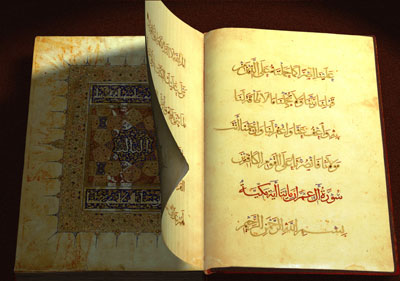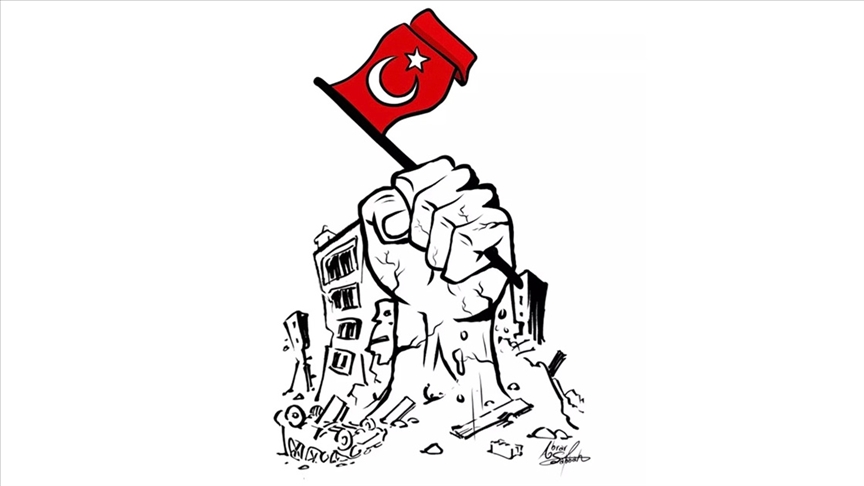The Qur’an instructs and guides us in every aspect of life. Lastprophet.info introduces us to Prophet Muhammad (saw) and informs us of his characteristics. In this article, we will be examining ten of the Prophet’s characteristics mentioned in the Qur’an:
1- Prophet Muhammad is the Last Messenger and Last Prophet
“I am like the last brick (of an excellent structure that has one brick missing). I am the last of the Prophets.” (Muslim, Fazail 22)
Messenger, envoy, and prophet mean one who informs, one who conveys messages. “Messenger” or “prophet” is used as a term to define those assigned to convey Allah’s Messages, His commands and prohibitions, and His recommendations and warnings. In the Turkish language, the word “prophet” is used for both prophet and messenger. In the Qur’an the “envoys” defined as mursal and nadhir (warner), bashir (bearer of good tidings) and hadi (guide to the truth), are those blessed with the Divine revelations, and those to whom the scriptures, commands and Divine wisdom were sent. (see; Al-Hadid 25-26; Al-Hajj 52; Al-Imran 79, 81; An-Nisa 63-165; Al-Ahzab 45)

Allah the Almighty sent a Prophet to every nation, Prophet Muhammad was sent as a Messenger to the whole of humanity. “Muhammad is the Messenger of Allah, and the last of the Prophets.” (Al-Ahzab 33:40)
The word hatem pronounced with predominate letter “te” in the Arabic text of the verse and in the Asim qiraat, is pronounced “hatim” in the other qiraats. Hatem is a verb that means the end of prophethood, or that the prophethood has been sealed, whereas hatim is the noun form that means the end or the seal of Prophethood. As a “seal” is used to confirm and certify something, it means the “end” and “verification.”
The verse defines that Prophet Muhammad is the last Prophet, and also that he was ranked as the divine seal acknowledging and certifying the previous Prophets, and that prophethood had come to an end.
The Prophet Muhammad described himself as the last in the chain of Messengers and the last Prophet: “I am like the last brick (of an excellent structure that has one brick missing). I am the last of the Prophets.” (Muslim, Fazail 22)
The development of humanism, in terms of religion, reached a climax and religion reached perfection with Prophet Muhammad. (Al-Ma’idah 5:3) There was to be no Prophet or Messenger after Prophet Muhammad. So whoever claims to be a Prophet, Messenger or Warner would be a liar and therefore would have claimed false prophecy.
2- Prophet Muhammad is the Messenger of the Whole of Humanity
“And We have not sent you except comprehensively to mankind as a bringer of good tidings and a warner. But most of the people do not know.” (Saba 34:28)
Since Adam, Allah the Almighty has sent a messenger to every nation. This is clearly defined in the verses of the Qur’an mentioned here: “And We certainly sent into every nation a messenger, (saying), “Worship Allah and avoid Taghut (evil).” (An-Nahl 16:36)“And there was no nation but that there had passed within it a warner. (Fatir 35:24) “..for every people is a guide.” (Ar-Ra’d 13:7)
Prophets prior to Prophet Muhammad were sent as messengers to one or more nations, whereas Prophet Muhammad was sent as a Prophet to the whole of humanity from 610 A.D. until the Day of Judgment. This is clearly stated in the Qur’an:
| Prophet Muhammad is the Last Messenger and Last Prophet |
“And We have not sent you except comprehensively to mankind as a bringer of good tidings and a warner. But most of the people do not know.” (Saba 34:28)
“And We have sent you, (O Muhammad), to the people as a messenger, and sufficient is Allah as witness.” (An-Nisa 4:79)
These verses of the Qur’an affirm the universality of Prophet Muhammad’s prophethood.
3- Prophet Muhammad is a bearer of glad tidings and a warner.
Many verses of the Qur’an states that Prophet Muhammad was sent as a bearer of glad tidings (bashir) and a warner (nadhir-munzir):
“We have sent you with the Truth as a bearer of good news and a warning...” (Fatir 35:24)
“You (O Muhammad) are not but a warner.” (Fatir 35:23)
The words bashir and mubashir mean a conveyer of the glad tidings of Allah’s pleasure, Paradise and its blessings; whereas nadhir and munzir means the warner of the torment and punishment of those who reject and disobey the Divine commands. Being a warner and bearer of glad tidings was a mutual characteristic of all the Prophets. Prophet Muhammad (saw) was assigned not only to warn his own people with the Qur’an, but also to to warn the whole of humanity: “…this Quran has been inspired to me, to preach it to you and whomever it reaches.” (Al-An’am 6:19)
“There has certainly been for you in the Messenger of Allah an excellent pattern for anyone whose hope is in Allah and the Last Day and (who) remembers Allah often.” (Al-Ahzab 33:21)
4-The Prophet Muhammad is the Most Excellent Model.
The example of the Prophet Muhammad is stated in the Qur’an as shaheed and uswa-al hasana. The dictionary meaning of shaheed is to witness, to testify, to know, be aware, to be present, and to confirm. In the Qur’an just as a witness is someone appealed to regarding information or evidence in respect of a certain event or issue of rights, (see An-Nisa 4:135) the Messengers and believers who are a good example to others in their faith, words, actions, behavior and conduct were also referred to as witnesses. (see Al-Ahzab 33:45)
Prophet Muhammad (saw) was an example to his followers in his speech, worship, morality, actions, activities, dealings and behavior. These verses of the Qur’an clearly define this: “And thus we have made you a just community that you will be witnesses over the people and the Messenger will be a witness over you.(Al-Baqara 2:143) “Allah named you “Muslims” before (in former scriptures) and in this (revelation) that the Messenger may be a witness over you and you may be witnesses over the people.” (Al-Hajj 22:78)
The words shaheed and shuhada mentioned in the Qur’an, not only indicate that on the Day of Judgment the Muslims will witness that previous Prophets conveyed the true faith to their nations, and that Prophet Muhammad (saw) will bear witness to the Muslims (Baydawi, I 214; Hazin, I 214), but also signifies a meaning of being an example in this world. (Yazir I 524)
Uswa-al hasana means being the most excellent example. The Prophet Muhammad as the most excellent model is defined in the Qur’an with the words: “There has certainly been for you in the Messenger of Allah an excellent pattern for anyone whose hope is in Allah and the Last Day and (who) remembers Allah often.” (Al-Ahzab 33:21)
This verse mentioning Prophet Muhammad (saw) as an example first for all Muslims in general, and then particularly for those who bear hope in Allah and the Last Day, is in fact aimed at defining the qualities of those to whom the Prophet will be an example. Prophet Muhammad is an example of excellence to the believers in his faith, worship, morality, in his words and every action.
5- Prophet Muhammad is an Advisor
The Qur’an clearly states that Prophet Muhammad is an advisor: “So remind, (O Muhammad); you are only a reminder. You are not over them a controller.” (Al-Ghashiya 88:21-22) “And remind, for indeed, the reminder benefits the believers. (Adh-Dhariyat 51:55) So remind, if the reminder should benefit; He who fears (Allah) will be reminded. But the wretched one will avoid it.” (Al-A’la 87:9-11)
6- Prophet Muhammad is a Caller to Truth and an Illuminating Lamp to All Those Around Him
One of the main characteristics and duties of Prophet Muhammad was calling the people to the truth. Those who perform the duty of calling people to the truth are called da’i. Prophet was referred to by this characteristic in the Qur’an. “And one who invites to Allah, by His permission, and an illuminating lamp.” (Al-Ahzab 33:46)
| Prophet Muhammad is an Advisor |
7- Prophet Muhammad is a Guide
One of the fundamental characteristics of a Prophet is guiding the People to the path of truth:
“You are only a warner, and for every people is a guide.” (Ar-Ra’d 13:7)
As in the case of all the previous Prophets, being a hadi (guide) as mentioned in the Qur’an, was also an attribute of Prophet Muhammad. The fact that the Prophet was a guide to the path of truth is clearly stated in the Qur’an. This verse is one of the examples: “And indeed, (O Muhammad), you guide to a straight path.” (Ash-Shuraa 42:52) The Prophets guidance consists of teaching people the path of righteousness, indeed Allah is the One who bestows guidance.
“And one who invites to Allah , by His permission, and an illuminating lamp.”(Al-Ahzab 33:46)
8- Prophet Muhammad Bears the Most Excellent Morals
“And indeed, you are of a great moral character.” (Al-Qalam 4) Hazrat Ali said: “The greatest of morals is the morals of the Qur’an.” (Qurtubi XVIII 227) Tabari (d.310) commented on the Prophets conduct with the words to the effect: “This is the morals of the Qur’an. Allah disciplined His Messenger with the Qur’an. And excellent morals are the objective of the Islamic religion.” (Tabari XIV 29/18)
Prophets morals favored by Allah’s compliments, were the morals of the Qur’an. When Said b. Hisham asked the Prophet’s dear wife Aisha, about the morals and manners of the Prophet, she asked him, “Do you recite the Qur’an” when he replied “Yes”, she said “His morals were the Qur’an” (Tabari XIV 29/18) and then recited the verse: “And indeed, you are of a great moral character.” (Al-Qalam 68:4) (Tabari XIV 29/19)
Prophet Muhammad bore the most excellent of manners. (Bukhari; Adab 112) As the religion of truth reached perfection, good conduct also reached perfection with Prophet Muhammad. The Prophet said: “I have been sent to perfect good character.” (Ahmad III-175; Malik, Huluk 8)
The Prophet gave great importance to good manners and supplicated: “O Allah! Grant me a character of beauty just as You created me with beauty.” (Ahmad, I 403. VI 68, 155) “O Allah! Guide me to the best of deeds and the best of morals, as none can guide to the best except You, and save me from bad deeds, as none can save me from what is bad except You.” (Nasai Iftitah 16, II 129) “O Allah! I seek Your protection from disunity, hypocrisy and bad character.” (Abu Dawud, Salah 367; see Nasai, Istiazah 21)
9- Prophet Muhammad was Immensely Merciful and Affectionate, and Very Devoted to His Followers
Prophet Muhammad was sent as a mercy to the whole of creation. And this fact is stated in the Qur’an: “And We have not sent you, (O Muhammad), except as a mercy to the worlds.” (An-Anbiya 21:107) “There has come to you a Messenger from among yourselves; Grievous to him is what you suffer; (he is) concerned over you, and to the believers is kind and merciful.” (At-Taubah 9:128)
The word haris in the Arabic text means something which is greatly aspired. The Prophet Muhammad deeply wanted all those around him to be believers, to do good deeds and attain the pleasure of Allah. “Perhaps, [O Muhammad], you would kill yourself with grief that they will not be believers.” (Ash-Shu’ara 26:3; also see Al-Kahf 18:6)
Raufmeans the most affectionate, the most tender, very kind and pitiful. (Qurtabi Al-Asna, p. 73-75) Indeed, the Prophet Muhammad was very kind and compassionate to his followers. Rahim means the most compassionate. Prophet (saw) was the most compassionate of all humans. He was merciful to all those around him, when someone said to the Prophet: “O Messenger of Allah! Curse the polytheists”, he replied: “I am sent as a mercy, not as a curse on humanity.” (Muslim, Birr, 87) Even when his face had been wounded during the battle of Uhud, he prayed for the disbelievers: “O Allah! Forgive my people for they know not.” (Ibn Hibban, Ad’iya No:973)
| Prophet Muhammad is a Guide |
10- Prophet Muhammad was Kind and Gentle
Prophet Muhammad was a very modest, gentle person. And because of this, he attracted the people around him. Allah the Almighty revealed this in the Qur’an: “So by mercy from Allah, (O Muhammad), you were lenient with them. And if you had been rude (in speech) and harsh in heart, they would have disbanded from about you. So pardon them and ask forgiveness for them and consult them in the matter. And when you have decided, then rely upon Allah. Indeed, Allah loves those who rely (upon Him).”(Al-Imran 3:159)
As a result, Prophet Muhammad (saw); was sent as a Messenger to the whole of humanity, and he is the last of the Prophets. Prophet-hood came to an end with Prophet Muhammad (saw).
He is bearer of glad tidings, a warner, an advisor caller to the truth, a guide, a Prophet of tenderness and mercy.
He was a Prophet who invited the people to the truth, who conveyed faith. (Al-Ma’idah 5:99; see An-Nahl 16:82) He was not a tyrant (Qaf 50:45), a controller (Al-Ghashiyah 88:22) or harsh (Al-Imran 3:159). He was lenient (Al-Imran 3:159) and a reminder (Al-Ghashiyah 88:21)
He related the revelations of Allah to the people, purified them from polytheism, blasphemy and hypocrisy, and taught them the Qur’an, its wisdom and what they did not know (Al-Jumu’ah 62:2; Al- Baqarah 2:151). He guided the people to the straight path (Ash-Shuraa 42:52). He commanded good and prohibited evil (Al-A’raf 7:157). He fought on the path of Allah (An-Nisa 4:84), he revealed the commands of the Qur’an and commands of religious topics (An-Nahl 16:44), and conveyed the lawful and unlawful (Al-A’raf 7:157; See At-Taubah 9:29)
He practiced the commands, rulings and prohibitions of the Qur’an in every aspect of his life. In his speech, behavior and essence, he was the most excellent example to the whole of humanity. He was a Prophet of love, affection and compassion, not of hatred and harshness.
Prophet Muhammad fulfilled his duty towards his followers in the most excellent manner. And the duty of his followers is to bear witness to his prophecy, obey his teachings, love him and embed this love into the hearts of others, and to practice and continue the religion he preached.
İsmail Karagöz, PhD









Why We Have So Many MASJIDS
ReplyDeleteIf ALLAH Is
EveryWhere?
Ans:
"AIR" Is Everywhere
But
We Need A "FAN" To FEEL It...:-)
Hafiz Ahmed Raza Qadri Naats